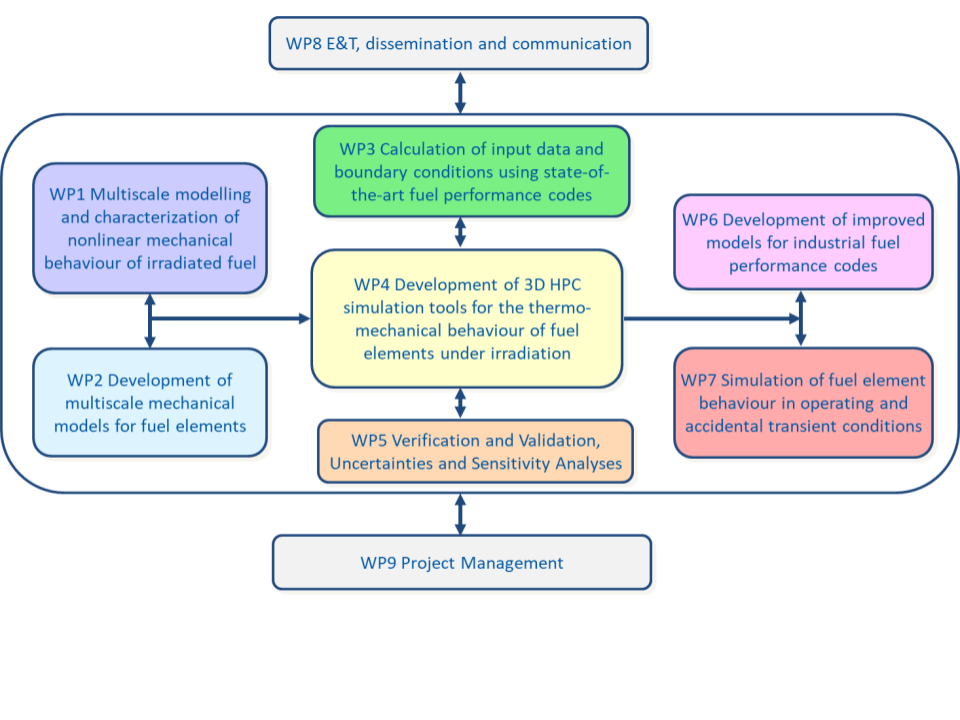In a nutshell
Electrification of the energy sector will be a key step for its transition to climate-neutrality. In order to achieve it by 2050, it will be necessary to maintain and even extend the production capacity of current nuclear reactors, while taking into account the evolving electricity mix and increasing requirements regarding the safety assessment of nuclear reactors.
On these points, the question of nuclear fuel behaviour is essential because it sets the main constraints to be satisfied for safe operation of nuclear reactors and defines the source term for accidental conditions.
Generation II and III reactor fuels in Europe take advantage of a large experimental feedback with a continuous evolution of fuel element design and materials, which allows maintaining high safety standards while adapting to the evolution of the operating conditions.
Fuel performance codes, which enable the simulation of the behaviour of the fuel elements in reactor, are now an essential component of the design, licensing and safety assessment of nuclear fuels.
The licensing of innovative fuel materials and design requires an extension of the current fuel performance codes to meet safety authority’s requirements, in particular regarding the Verification, Validation and Uncertainties Quantification processes.
Opera HPC will work on four aspects to improve the approach and computational tools used by the nuclear research community and industry.
| Basic research on the mechanical behaviour of fuel under irradiation | Code development | Industrial application | Education and training and dissemination of the project’s results |
| Obtain missing data, identify elementary mechanisms and develop physics-based models of the non-linear mechanical behaviour of fuel and fuel elements | Open source 3D HPC simulation tools with parallel computing capabilities at the microstructure and fuel element scales, as well as a meshless prototype tool | Improved industrial models and application to the simulation of the thermo-mechanical behaviour of enhanced accident tolerant fuel elements in normal and accidental conditions | Transfer of approach, tools and results through open-access publications, workshops and exchanges with industrial end-users and training of a new generation of researchers |
Work packages
To reach its objectives, the project is organised in 9 work package.

PARTICIPANT LIST
COMMISSARIAT A L ENERGIE ATOMIQUE ET AUX ENERGIES ALTERNATIVES
CENTRO DE INVESTIGACIONES ENERGETICAS, MEDIOAMBIENTALES Y TECNOLOGICAS-CIEMAT
ELECTRICITE DE FRANCE
ENEA AGENZIA NAZIONALE PER LE NUOVE TECNOLOGIE, L’ENERGIA E LO SVILUPPO ECONOMICO SOSTENIBILE
FRAMATOME
LIETUVOS ENERGETIKOS INSTITUTAS
NINE NUCLEAR AND INDUSTRIAL ENGINEERING
POLITECNICO DI MILANO
SINTEC SRL
UJV REZ, a. s.
UNIVERSITA DI PISA
TEKNOLOGIAN TUTKIMUSKESKUS VTT OY
KUNGLIGA TEKNISKA
JRC -JOINT RESEARCH CENTRE- EUROPEAN COMMISSION
PAUL SCHERRER INSTITUT
ECOLE POLYTECHNIQUE FEDERALE DE LAUSANNE
BANGOR UNIVERSITY
NATIONAL NUCLEAR LABORATORY LIMITED
NEWSLETTERS
FIRST NEWSLETTER:
News AND Events
The Project 1st Year meeting has been held on
Nov 21-22nd 2023 in Milan, at Campus Bovisa at Politecnico di Milano, building BL25, Via Lambruschini 4A
OperaHPC has sponsored the NuFuel workshop, on November 07-09th 2023, Marseille
The Project kick off meeting has been held on
Nov23-24th 2022 in Aix en Provence

